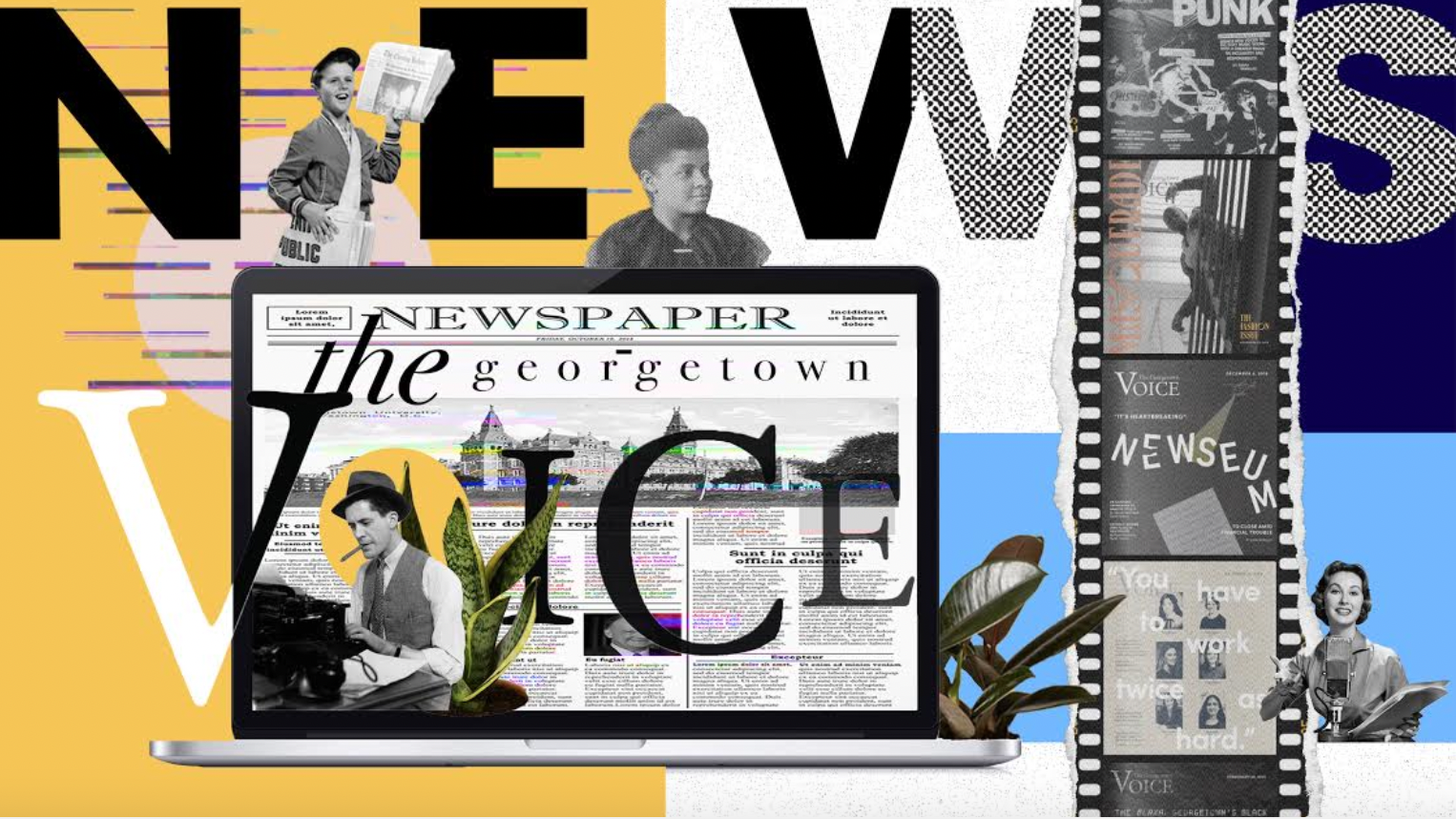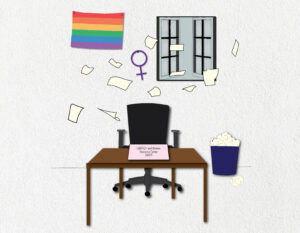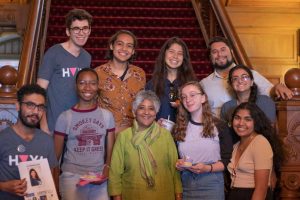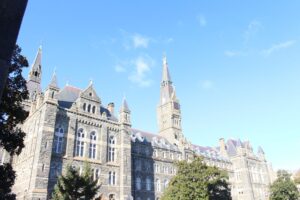Members of the Georgetown and greater D.C. communities gathered on March 15 in the Office of Student Equity and Inclusion (OSEI) for an afternoon of raffle prizes, snacks and eliminating online gender gaps.
The event titled: Channeling Rage – Georgetown University Wikipedia Edit-a-thon was held by Georgetown University’s Massive Data Institute (MDI), along with 10 other Georgetown-affiliated groups, including the Women’s and Gender Studies Program, GU Politics, the Office of Scholarly Publications, and the Lauinger Library. Amid National Women’s History Month, the event aimed to help close the ever-present gender gap on the Wikipedia website by adding more women to the platform.
Wikipedia, an extremely popular and accessible online encyclopedia, has acted as an invaluable resource to millions of people since its launch in 2001. Still, the gender bias of the platform has remained prevalent since its launch, meaning female achievements on the website are exceedingly underrepresented.
As of 2022, only 19 percent of all English Wikipedia biographies were written about women. This gender bias towards platforming men on the online encyclopedia has been largely attributed to the gender gap between male and female editor contribution; currently, only 15 percent of editing contributors to Wikipedia are women.
Wikipedia editing is meant to be user-friendly, and just about anyone can edit articles without creating an account. The encyclopedia has editing guidelines and suggestive policies like neutrality, respect, and civility, but no strict editing laws. This allows partially edited or poorly written articles to develop over time into exceptional pieces.
The frustration felt by women due to the underrepresentation of female achievements on the site, coupled with the lack of female contributors on the site, was the focal point of the event. This Women’s History Month, the Women’s Center embraced ‘Rage Renaissance: Challenging Gendered and Racialized Narratives’ as its theme in order to explore ways that women can harness anger for political and personal change.
Women’s emotional liberation is a prevailing subject, especially in the political realm, and women often feel forced to resist their feelings to avoid being seen as “too emotional.” According to a Georgetown Center on Education and Workforce (CEW) analysis, 13% of Americans still doubt the emotional suitability of women for political office. Although restricted to the political domain, this is just one example of the wide range of gendered barriers women face in regard to their emotions.
The Women’s Center hosted this event as a way for women to examine the ways that controlling women’s emotions, especially rage and anger, has historically oppressed women, leading among many other things to a lack of women’s representation on the site.
During the event, hands-on training on how to make edits and create content on Wikipedia articles relating to the role of women in politics, STEM, and the arts, was provided by Ariel Catrone, the Institutional Partnerships Manager for Wikimedia D.C. After training on how to edit Wikipedia biographies, community members were dispersed throughout the lounge at tables and sofas, and were provided with delicious snacks to embark on an afternoon of light chatting, connecting, and drafting.
Jazmin Clark (CAS ’26), an active member of guWeCode, a collaborating organization in the event, attended as a volunteer and was enthusiastic about its impact and its intersection with the unique Women’s History Month theme. “The energy here is very fun and it was a great opportunity for women to get involved,” she said.
Participants successfully learned to produce new content, revise current statements on the website and add strong citations, leading to the creation of over 3,200 new words on the site.
Dr. Nadia E. Brown, Professor of Government and Chair of the Women’s and Gender Studies Program, was invited as a guest speaker for the event. Dr. Brown specializes in Black women’s politics and seeks to push beyond disciplinary constraints. She heartily discussed how Wikipedia provides a wealth of knowledge and can be both a powerful and an incredible resource, especially for Black women. The latest Wikimedia Community Insights Report states that as of 2020, Black people continue to be underrepresented and only account for 1.1% of active Wikipedia editors in the U.S.
“The event positively contributed to underrepresented communities on Wikipedia by bringing attention to topics and individuals that may have been overlooked in the past. By increasing the representation of diverse perspectives, we can create a more comprehensive and accurate encyclopedia,” Dr. Brown said.
Georgetown student, Jasmine Criqui (CAS ’26), an avid Wikipedia user, was particularly struck by Professor Brown’s speech and how she exposed the ways that Wikipedia can be used as a powerful resource. Criqui took upon editing a Wikipedia article on multimedia artist Baseera Khan, after feeling inspired and engaged in Wikipedia editing and content through the event.
“I actually saw one of her [Khan] exhibitions at Georgetown last year, in the De La Cruz gallery and I was really struck by it, so when I saw it on the [editing] list, I was like ‘yeah, that’s the one.’ I’m really glad there are projects out there like this one that are working to close the gender gap,” she emphasized.
By the end of the event, the MDI ultimately championed feminist rage as a tool for activism and achieved its goal of closing gender gaps by recruiting 25 new Wikipedia editors.
Closing speaker Rebecca MacKinnon, Vice President of Global Advocacy at Wikimedia Foundation, encouraged the audience to collaborate and continue to think about their place on Wikipedia.
“By editing Wikipedia, you’re taking action to make our global information ecosystem better, one edit at a time,” MacKinnon celebrated.
“We need everybody’s help to close the knowledge gaps on Wikipedia and beyond. Help us change the stats. Start by helping us bring more women onto Wikipedia, into Wikipedia, and help us advance greater equity.”






